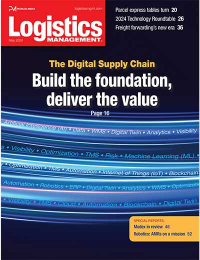Retaining key talent is among priorities for supply chain leaders

A talent shortage continues to plague supply chain operations, according to the Q4 2022 Global Leadership Monitor from Russell Reynolds Associates (RRA), but there are plans in place to address this.
The availability of key talent/skills was cited by 68% of respondents and leads the way as the top concern for executive leadership. That figure is up 9% since the spring 2021 survey and edged out uncertain economic growth, which was cited by 67%, for the top spot. Other top-five concerns included changes in consumer behavior, cited by 38%, geopolitical uncertainty (34%), technology change (33%) and major health threats (21%). The last two items fell 15% and 27% since the spring 2021 survey.
“When it comes to the availability (or lack thereof) of critical talent, most leaders still feel vulnerable, with only 43% of leaders reporting that the leadership team at their organization is prepared to address the challenge, compared to 41% in the spring of [2022],” the report from the RRA, a leadership advisory firm, said.
The report was authored by five Russell Reynolds Associates’ Operations and Supply Chain Officers executives, including Ben Shrewsbury, who leads Russell Reynolds Associates’ Operations & Supply Chain Officers capability globally.
Differing views
Shrewsbury told Supply Chain Management Review that some of the movement in the survey was interesting, noting that operations and supply chain leaders “tend to be more pragmatic, more risk averse.”
But as economic uncertainty remains, operations and supply chain leaders appear poised to double down on their talent, rather than cutting it. RRA said that “operations & supply chain leaders do not think more talent will come available during a recession, meaning that organizations will likely try to hold on to current talent.”
Ninety-four percent of respondents indicated they plan to invest in retaining critical talent, company to just 37% that indicated workforce reductions were part of the plan.
“We saw from those results the whole notion of investing into and retaining critical talent really being the most important lever to pull from an ops and supply chain perspective, and the least important being workforce reduction,” Shrewsbury said.
Areas of focus
Optimizing the business portfolio (93%), implementing cost-cutting measures (87%) and investing in digital and technology (83%) are also items respondents cited as being important or very important to responding to a possible recession.
Optimism from executives around economic uncertainty wasn’t very high, with only 46% saying their leadership teams are prepared, a drop of 4% from the prior year.
Of note is the divergent of views on the importance of certain concerns between operations and supply chain leaders and their CEOs. While both groups cited the same six concerns, operations and supply chain leaders are more worried about uncertain economic growth (82% vs. 65%) and changes in consumer behavior impacting the business (49% vs. 35%).
View from the front lines
“In our report, there is a lot of consistency in what are the top internal factors are,” Shrewsbury said. “But the percentage of ops and supply chain leaders who are more concerned about uncertain economic growth and the availability of talent and the changes in consumer behavior - that is where the gap is.
“Ops and supply chain leaders have been on the front lines and I think they are tired. They know what the effort is needed to (get through an economic recession),” he added.
The two groups are more closely aligned on other topics, including availability of key talent/skills (61% vs. 59%), geopolitical uncertainty (42% vs. 37%), return to work/hybrid work (35% vs. 33%) and technological change (32% vs. 29%).
The survey also found that CEOs feel much more prepared to address the top threats to their organizations, with 41% indicating they are prepared, compared to 36% of operations & supply chain leaders who think their organization is prepared.
Organizational risk
On an individual threat basis, CEOs are more optimistic around dealing with uncertain economic growth (41% vs. 36%), change in consumer behavior (48% vs. 31%) and return to work/hybrid work (74% vs. 52%). On the flip side, operations & supply chain leaders are more confident around the availability of key talent/skills (53% vs. 49%), geopolitical uncertainty (36% vs. 24%). The groups are tied on technological change at 54%.
“Our research shows clear differences between operations & supply chain and CEO cohorts’ priorities,” the authors wrote. “Inconsistent perspectives within the C-suite can result in leadership team members operating from different rulebooks, which introduces significant organizational risk.”
“At the end of the day, you have leaders and how they operate together is so important, but they do where functional hats,” Shrewsbury noted. “I think ops and supply chain leaders tend to be more pragmatic and less risk averse; thinking about the how rather than the why and what.”
Shrewsbury said he has seen a change in supply chain operations in the nine years the firm has been doing this survey. More companies are starting to incorporate operations and supply chain leaders into broader operational discussions.
“Progressive, open-minded boards are starting to think about how to bring in some of that perspective,” he said.
Advice on becoming best in class
The firm advised engaging in honest dialogue about risks and risk preparedness, gain a full view of a prioritized list of problems with the use of more advanced behavioral diagnostics to learn more about people’s beliefs and behaviors, and elevating operations & supply chain leaders to equal stature with other C-suite leaders to provide an avenue for voicing concerns and becoming more engaged. Shrewsbury also said open lines of communication is also important.
More best-in-class companies are adopting these approaches, and according to Shrewsbury, “it’s not going to go back, and more is going to be expected.”

Article Topics
Talent Management News & Resources
32nd Annual Study of Logistics and Transportation Trends: Navigating a shallow pool of resources Retaining key talent is among priorities for supply chain leadersLatest in Logistics
Preliminary April North American Class 8 net orders are mixed Senators take a close look at Amazon with Warehouse Worker Protection Act Despite American political environment, global geopolitical risks could be easing Maryland DOT: $1.9 billion and up to four years to rebuild bridge sunk near Baltimore port April Services PMI contracts after 15 months of growth, reports ISM 2023 industrial big-box leasing activity heads down but remains on a steady path, notes CBRE report Comau’s Advanced Solutions Drive The Benefits Of Automation For Diversified Industries More LogisticsSubscribe to Logistics Management Magazine

Find out what the world's most innovative companies are doing to improve productivity in their plants and distribution centers.
Start your FREE subscription today.
May 2024 Logistics Management

Latest Resources














